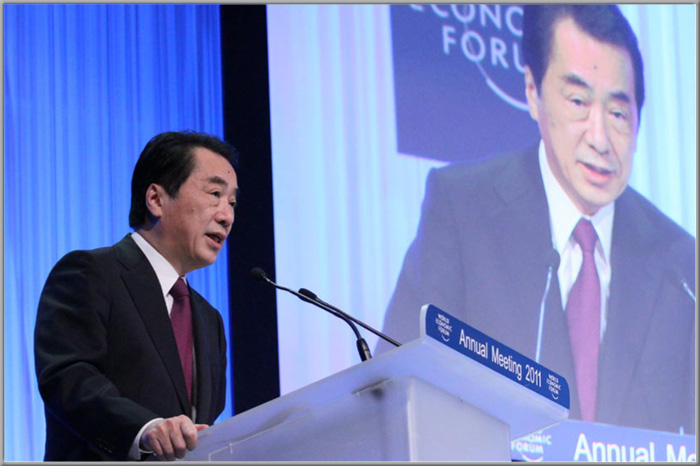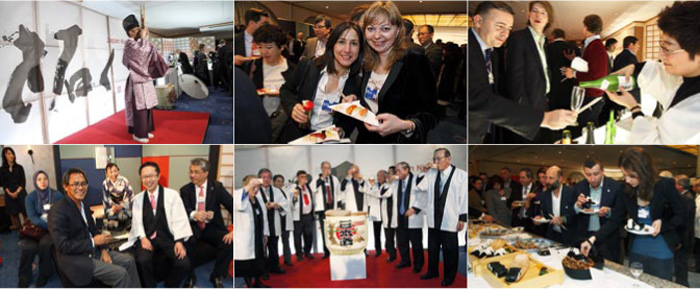Home > Highlighting JAPAN > Highlighting Japan FEBRUARY 2011 > Opening Japan and Reinventing KIZUNA
Highlighting JAPAN
PRIME MINISTER’S DIARY

Caption: Prime Minister Kan speaks at the World Economic Forum in Davos, January 29
Credit: CABINET PUBLIC RELATIONS OFFICE
Opening Japan and Reinventing KIZUNA
Prime Minister Naoto Kan delivered a speech, “Opening Japan and Reinventing KIZUNA,” at the World Economic Forum in Davos on January 29.
“The theme of this year’s gathering—‘Shared Norms for the New Reality’—matches my own perspective,” Prime Minister Kan said. “In the twenty-first century, there is growing concern in Japan that in the midst of its economic stagnation the minds of its people including the youth are becoming inward-looking. Opening the nation is needed through breaking out of this stifling atmosphere in people’s minds and in the economy. At the same time, forging new connections between individuals is needed so that the opening of the nation will not bring about rupture among people.”
Prime Minister Kan explained that such connections are known as “kizuna” in Japanese.
The Prime Minister went on to explain that Japan first opened itself to the outside world a little over one and a half centuries ago, when the nation abandoned the samurai government’s policy of national seclusion, then opened itself for a second time after the end of World War II.
“This spirit of opening up the nation is now called for in Japan,” Prime Minister Kan said. “One specific policy is the promotion of economic partnerships. The Japanese Government will continue to hold consultations with the United States and other relevant nations and will reach a decision on whether to join negotiations on Trans-Pacific Partnership Agreement (TPP) by around June this year. We also very much look forward to beginning negotiations this year with the EU, another important trade partner for Japan.”
Today, there are concerns around the world about whether tackling global environmental problems is compatible with economic growth. “My view is that they are compatible,” Prime Minister Kan said, explaining that the key is “innovation.”
“Japan is a top runner in this area. Japanese hybrid vehicles, which enjoy a 90% global market share, and LED lights produced in Japan both have the potential to reduce CO2 emissions by around 40% compared to conventional products.”
The Prime Minister emphasized that Japan would continue to “take the lead in grappling with the issues facing the world, including in the area of the environment, showing the global community models of ways to overcome them.”
In closing his speech, Prime Minister Kan referred to the two Japanese scientists who were awarded the Nobel Prize in Chemistry last year.
“Their achievement was a scientific method known as cross-coupling, which is to separate bound atoms and molecules and create innovative materials by forming different bonds among them. The role expected of the world’s leaders today would be that of the catalyst in cross-coupling. As the leader of Japan, I want to achieve a cross-coupling for Japan and for the wider world as well.”
Japan Night 2011
Among the many side events of the World Economic Forum in Davos this year was Japan Night, held on January 27. JETRO (Japan External Trade Organization) hosted the event, which featured traditional performances including Japanese court music as well as sushi and other Japanese foods including the popular winter-season hotpot, oden. Supachai Panitchpakdi, secretary-general of the United Nations Conference on Trade and Development (UNCTAD), Klaus Schwab, the founder and executive chairman of the World Economic Forum, and Francis Gurry, director general of the World Intellectual Property Organization (WIPO), were among those to enjoy the party.
Prime Minister Kan would later refer to Japan Night in his speech at Davos, saying, “Many people must have enjoyed it. Japanese food culture, which took form in the particular cultural milieu of our nation, is now attracting praise around the world as delicious and healthy. Japanese people are very pleased with this. In fact, the output of Japan’s agriculture ranks fourth in the world. As the attractiveness of Japan’s food culture spreads throughout the world, it is possible for Japanese agriculture to revitalize itself as a growing industry.”
Caption: Snapshots of Japan Night 2011
Credit: COURTESY OF JETRO
© 2009 Cabinet Office, Government of Japan







